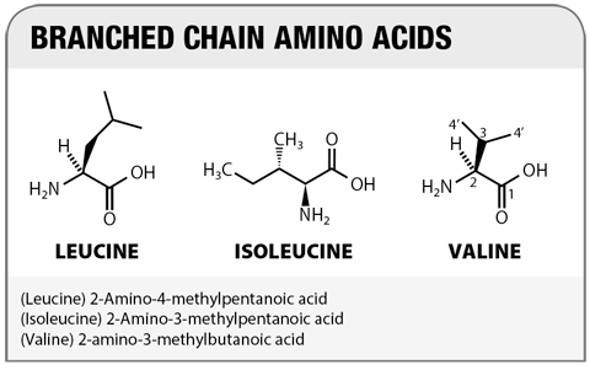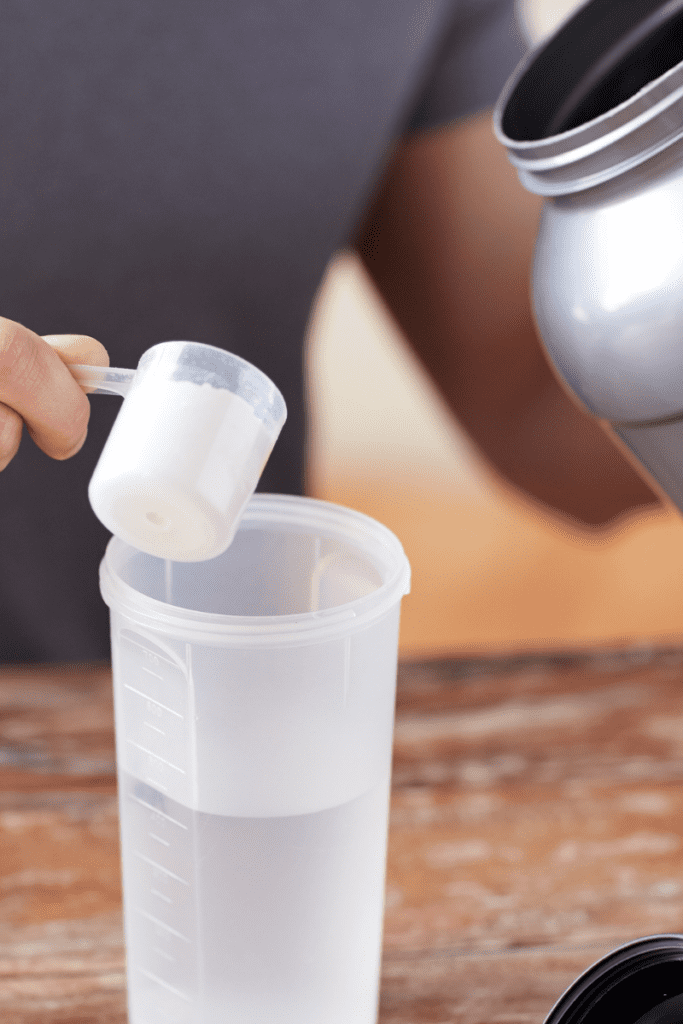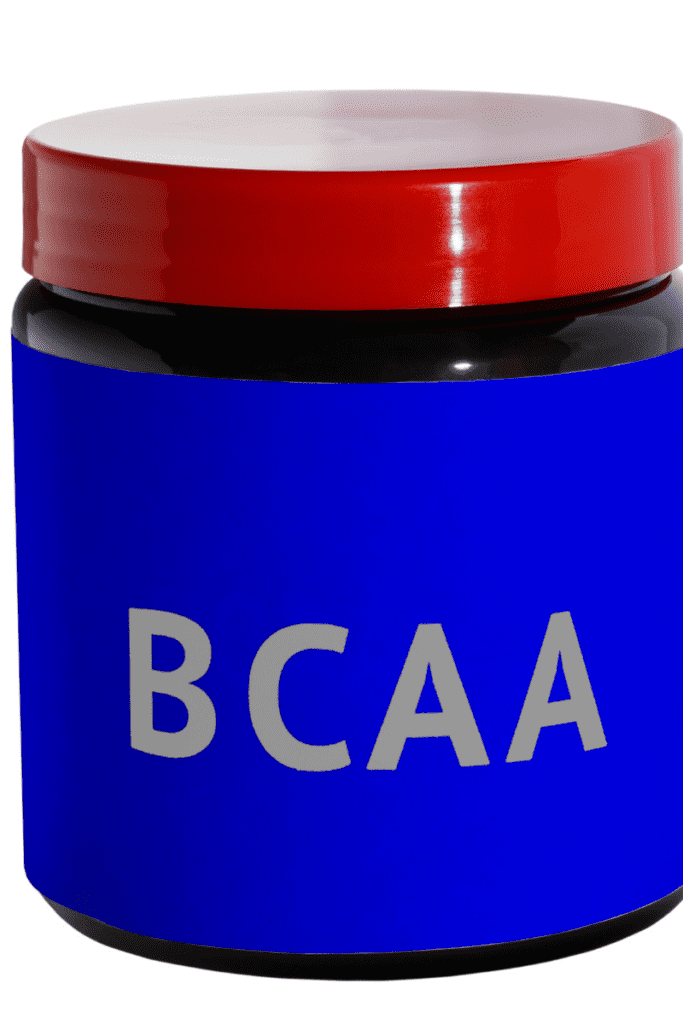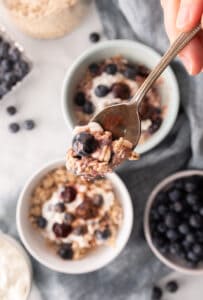BCAAs for Runners: Should You Take Them?
- December 16, 2021
- Last Updated: November 6, 2023
- 1 Comment
- Sports Nutrition
Maybe you’ve heard of BCAAs from your weight lifting friend, but are BCAAs for runners necessary? What do they do? How much should you take or should you skip them all together? Let’s break down the science!
Disclaimer – This post is for informational purposes only and is not for diagnosing or treatment. See your medical provider or Registered Dietitian for individual recommendations.
As an Amazon Associate, I may earn from qualifying purchases. You can read more here on our Disclaimer and Privacy Page.
The world of sports nutrition and supplements can feel very overwhelming. You may hear one thing from a teammate or an influencer, and think you need to jump on the next trend!
Are BCAAs for running even helpful? If so, should you have bcaas before running, or after?
Here’s what we’ll discuss in this article.
What Are BCAAs?
Branched chain amino acids, also known as BCAAs, are specific types of amino acids, which are the building blocks of protein.
The branched-chain amino acids are a group of three (of the nine) essential amino acids: leucine, isoleucine and valine.
These three are essential because our bodies do not make them and, therefore, they must be consumed through food or supplements.
Since people tend to think more is better, there is some belief that bcaas for runners can help fight fatigue.
BCAAs are branched-chain, and their different structure does make them a little unique compared to the other amino acids.

They can be oxidized in the muscles for fuel, rather than having to go to the liver and then the muscles. This is why they are integral to skeletal muscle metabolism.
This may be a primary reason for the interest in BCAAs for endurance athletes and as a popular sports supplement.
BCAAs have been shown to be helpful for:
- Muscle growth, repair and muscle soreness (DOMS)
- protein synthesis
- reduced fatigue (especially during longer exercise bouts)
- Energy regulation/production
- Muscle metabolism
- Hemoglobin production
- and more
BCAAs and Running: Are BCAAs for Runners Necessary?
Now we know a little bit more about BCAAs, so let’s zone into bcaas and running, specifically.
Runners and athletes have higher protein needs, as we discussed in this article about protein for runners and athletes.
This is because there is a lot of muscle breakdown and repair needed to support exercise and recovery.
This protein requirement is in addition to the other roles of dietary protein, such as hormone and enzyme production, immunity, red blood cell production, stabilizing blood sugar and more.

Leucine, in particular, is the most popular and commonly studied branched chain amino acid, as it is a key regulator of muscle protein synthesis (MPS). It is often taken in supplement form to help promote muscle hypertrophy and strength.
Research studies on the effects of BCAAs are currently inconclusive as to their efficacy on muscle strength and hypertrophy.
BCAA supplementation may help reduce muscle soreness following exercise if the diet is not adequate in protein.
However, the addition of leucine to diets of adequate protein has been shown to have no benefits to strength.
Note that creatine for runners is something completely different from BCAAs, and there is a slew of research about creatine for athletes, and for other benefits like brain health too.
Here’s a better breakdown and differentiation between the two: BCAAs vs creatine
Bottom line: If your diet is adequate in protein, you probably don’t need to take a BCAA supplement. If someone is unable to consue enough protein daily, supplementing with leucine may be warranted.
Fouré, A., & Bendahan, D. (2017). Is Branched-Chain Amino Acids Supplementation an Efficient Nutritional Strategy to Alleviate Skeletal Muscle Damage? A Systematic Review. Nutrients, 9(10), 1047. MDPI AG
Food Sources of BCAAs for Runners
Getting BCAAs from food sources is preferable to supplements because food sources contain all the essential amino acids,
Furthermore, food is generally better absorbed and contains synergistic nutrients, too.

Sources of BCAAs in food include:
- Meat (Butcher Box has great quality meat and seafood for delivery)
- Fish
- Eggs
- Milk
- Greek yogurt and greek yogurt smoothies
- Cottage cheese
- Protein powders
- Beans & lentils
- Tofu & tempeh
- Nuts & seeds
If you’re trying to increase your protein intake, having a meat delivery service, like Butcher Box, is a great solution. Add fish to your weekly rotation, and aim for 25-30 grams of protein per meal.
SAVE $50 WHEN YOU TRY BUTCHER BOX TODAY! Butcher Box sends you nourishing, grass-fed, organic meat and seafood. My personal favorites are the wild caught salmon, organic free range diced chicken breast, and beef barbacoa. We have so many recipes with these nutritious, delicious ingredients, like this salmon below.
Save $50 on your Butcher Box order!

Benefits of BCAA Supplements
A 2012 study found that 62% of the US population uses amino acid supplements on a daily basis, so this is something pertinent to many of us.
As we discussed in our breakdown of supplements for runners, supplements are not regulated by the FDA so it is important to be working with a medical expert when supplementing.
You also want to make sure you are taking a quality supplement if you choose to go the supplementation route.
So, let’s talk a little bit about BCAA for runners and if/how endurance athletes can benefit from them.

When thinking about the best bcaa for runners, you want to consider why you’re taking it and when.
For example, should you take bcaas before running or after?
Review of the Research
Here’s what we can gauge from the research:
- BCAA supplementation may help reduce muscle soreness following exercise. There is some evidence that they may promote muscle building after exercise and suppress the breakdown of muscle protein. The proposed method behind this is that they may inhibit cortisol, our stress hormone, which can lead to muscle breakdown, so suppressing this can reduce the breakdown.
- Another potential advantage of BCAA supplements is that they may reduce fatigue during exercise. Higher levels of BCAAs are postulated to limit the entry of tryptophan into your brain. This may be helpful since tryptophan is used in the process of making serotonin, a neurotransmitter related to fatigue in physical exercise.
- BCAAs may also aid in glycogen storage, which can be very helpful for endurance runners! By preserving glycogen stores, they may theoretically reduce fatigue during prolonged exercise.
- In one study of slow (not elite) marathon runners, supplementing with BCAAs and carbohydrates did help reduce postrace fatigue.

However, again, while these are benefits, if the diet is adequate in protein (>=1.2 g/kg/day protein), the muscular performance benefits as a result of BCAA supplementation are likely negligible.
Meaning, you can get the same benefits by eating enough protein and eating it consistently throughout the day.
Rather than taking BCAAs before running, focus on a balanced breakfast with adequate carbs and protein. And, replenish your glycogen and muscles with carbs and more protein.
Many of these healthy snacks for athletes have high-protein options.

BCAA Supplement Recommendations
If you choose to take BCAA supplements for running, note the following:
- While there is no official dosage recommendation, studies provide ranges from 200-500mg/kg per day. The tolerable upper intake level (UL) for leucine is unknown, but in healthy adult men, it can be suggested at 500 mg/kg/day or ~35 g/d as a cautious estimate.
- The best time to take BCAA supplements is before and/or after a workout. There isn’t a huge difference for those who choose to take a bcaa before running vs bcaa supplement after running. People who are trying to gain muscle may also take them in the morning and before bed as well.
- A long supplementation period (>10 days) appears necessary to see beneficial effects.
- As always, look for a high-quality supplement, such as an NSF Certified for Sport BCAA supplement. This is as close to the best BCAA supplement for runners you’ll find. We recommend Klean Athlete or Thorne.
- Again, remember that if your diet is adequate in protein, the benefits of a supplement may be negligible.
Special Considerations
Protein Powder Vs. BCAA
Most complete protein powders should and will contain branched chain amino acids. Remember, you can get them in food.
A protein powder is a more complete supplement, whereas, BCAA supplements are conditional and will only contain those 3 amino acids: leucine, valine and isoleucine, unless anything else is added.
Should you take a BCAA if you take protein powder?
For more bang for your buck, you’d get more out of a protein powder. However, if you don’t necessarily need the calories and other things, you could just take an isolated BCAA supplement in and around exercise.

Vegans and BCAAs
If someone is following a vegan runner diet with no animal products, they may need to use a supplement, such as a plant-based protein powder, to get enough protein and plant-based BCAAs in their diet.
Plant-based foods such as beans, lentils, quinoa, tofu, tempeh, nuts, and seeds, do contain protein and BCAAs. But, if runners are not intentional about their intake, they may find themselves lacking in one or more of these amino acids.
One vegan BCAA supplement option is Durasport’s, which contains collagen too.
Another vegan protein powder with BCAA is Vega Sport.

BCAAs for Injury Recovery
BCAAs, due to their potential muscle protein synthesis capacity, may be beneficial for the injured athlete or runner. This is especially true if the athlete is inadequately fueling by not getting enough calories and/or protein (either intentionally or unintentionally) and is in an energy deficiency state.
This is when we really may stand by taking bcaas for running. Similar to above, the timing of BCAA supplementation may be beneficial for an athlete to recover from an injury, such as taking before and/or after a rehab or exercise session.

Again, if the diet is adequate in calories and protein, BCAA supplements will likely not provide any additional benefits, but is another tool in the toolbox to consider.
Protein needs are higher with injuries as well, so hopefully, if someone is eating more protein, they will be getting more BCAAs alongside.
Collagen may also be helpful for joint injuries.
BCAAs and Older Adults
Any population that is at risk of malnourishment, such as the elderly, may also benefit from BCAA supplementation.
If they are unable to get enough calories and protein through their diet, supplementation may be beneficial.
Supplementing BCAAs may help the elderly remain in muscle protein balance as well as help to prevent rapid decline of muscle mass, which occurs as we get older. This decline also occurs more rapidly with inadequate nutrition and/or strength training.

Bottom Line
- Safety – BCAAs are safe, however, they may not be necessary for those eating enough protein. It may be more prudent, less costly and more effective in the long term to make dietary improvements rather than relying on supplements for peak performance.
- Timing – Whether you take a bcaa before running or after your workout doesn’t seem to make a huge impact.
- Food Sources – There are several food sources of bcaas that you can also consider if supplementation doesn’t feel right for you.
- Talk to a Professional – Always consult with a healthcare professional, such as a sports dietitian, before taking any supplements.
If someone’s diet is lacking in total calories and/or protein, protein powders after running and BCAA supplements may be warranted for exercise, but it is unclear if they provide much benefit.
- Upper Body Workout for Runners
- Low carb diet and running
- Race day nutrition 101
- Runners stomach nutrition tips
- Caffeine before running
- Coffee vs Pre Workout
References:
- Tomé D, Benoit S, Azzout-Marniche D. Protein metabolism and related body function: mechanistic approaches and health consequences. Proc Nutr Soc. 2021 May;80(2):243-251. doi: 10.1017/S0029665120007880. Epub 2020 Oct 14. PMID: 33050961.
- Fouré, A., & Bendahan, D. (2017). Is Branched-Chain Amino Acids Supplementation an Efficient Nutritional Strategy to Alleviate Skeletal Muscle Damage? A Systematic Review. Nutrients, 9(10), 1047. MDPI AG. Retrieved from https://www.mdpi.com/2072-6643/9/10/1047
- Kim, D. H., Kim, S. H., Jeong, W. S., & Lee, H. Y. (2013). Effect of BCAA intake during endurance exercises on fatigue substances, muscle damage substances, and energy metabolism substances. Journal of exercise nutrition & biochemistry, 17(4), 169–180. https://doi.org/10.5717/jenb.2013.17.4.169
- Plotkin, D. L., Delcastillo, K., Van Every, D. W., Tipton, K. D., Aragon, A. A., & Schoenfeld, B. J. (2021). Isolated Leucine and Branched-Chain Amino Acid Supplementation for Enhancing Muscular Strength and Hypertrophy: A Narrative Review, International Journal of Sport Nutrition and Exercise Metabolism, 31(3), 292-301. https://journals.humankinetics.com/view/journals/ijsnem/31/3/article-p292.xml
- Rajavel Elango, Karen Chapman, Mahroukh Rafii, Ronald O Ball, Paul B Pencharz, (2012). Determination of the tolerable upper intake level of leucine in acute dietary studies in young men, The American Journal of Clinical Nutrition, 96(4), 759–767, https://doi.org/10.3945/ajcn.111.024471
Support Bucket List Tummy




























Like This Content?
Support Bucket List TummySo much great information in this edition of the newsletter – Thank you Sarah!